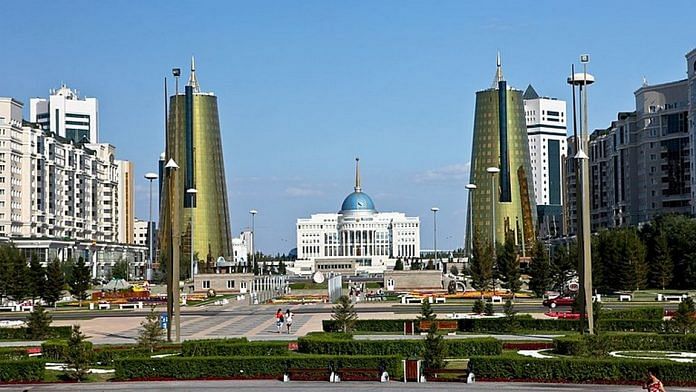New Delhi: India and Pakistan are finally set to play each other in the ongoing Davis Cup on 29-30 November. With tensions between the two nations at an all-time high, following the scrapping of Article 370 in Jammu and Kashmir on 5 August, the Indian team had refused to play in Pakistan.
The venue of the tie, earlier scheduled to be held in Islamabad, has now been shifted to a much more ‘neutral zone’ — Nur-Sultan.
Where’s that, you say?
Nur-Sultan is the capital of Kazakhstan and has had many names over the past several years. Until 1961, it was known as Akmolinsk, from 1961–1992 as Tselinograd, from 1992–1998 as Aqmola — which translates to ‘White Tomb’ in Kazakh — and from 1998–2019 as Astana.
The capital was named Nur-Sultan this year in honour of Kazakhstan’s longtime leader Nursultan Nazarbayev who stepped down in March 2019 after 30 years in power. He was the country’s first president and succeeded by Kassym-Jomart Tokayev, with Askar Mamin as the prime minister.
In his role as the president, Nazarbayev invested a lot of the country’s oil profits in a drastic makeover of the capital city in the form of expansions and reconstruction work.
With the help of Japanese architect Kurokawa Kishō, who also designed Kazakhstan’s presidential palace, and British architect Sir Norman Foster, who designed the new Palace of Peace and Reconciliation in Nur-Sultan, Nazarbayev initiated much of the capital city’s development and modernisation work.
Also read: Boroline — the cure-all that is stuck in time but still brings joy, especially to Bengalis
Titled the City of Peace by UNESCO
In 1830, during the Russian Imperial era, Nur-Sultan, which was then known as Aqmola was under Russian rule. The city was considered to have geographic advantages, given its connectivity via picket roads to Kargaly in its east, Aktau fort in its south, and Kokchetav in the west.
During World War II, the capital was used to transport engineering tools and equipment in the Union of Soviet Socialist Republics (USSR). While the war and violence had ruined everything in the USSR, Nur-Sultan was considered a place that had the potential for a booming economy.
Eight years after Kazakhstan’s independence, when it became a democratic, secular and constitutional republic in 1991, Nur-Sultan, then known as Astana, was awarded the medal and title as the City of Peace by UNESCO.
Situated in the north-central part of Kazakhstan, at the banks of the Ishim River, Nur-Sultan is the second coldest national capital in the world, after Mongolia’s Ulaanbaatar. The city has a continental climate, which essentially means that it has hot summers and extremely long, cold and dry winters. Temperatures range from +35 °C (95 °F) in summers while mid-December till early March months see a sub-zero temperature of −30 to −35 °C (−22 to −31 °F).
That Nur-Sultan was chosen as a neutral location for both India and Pakistan is no surprise. The capital has served as a diplomatic platform on numerous occasions, having hosted talks between the Assad regime and Syrian opposition. The 12th Ministerial Conference of the World Trade Organization (WTO) will also take place here next year.
All that remains to be seen now is who will catch a chill on the tennis court?
Also read: Who is Michael Bloomberg? 77-yr-old billionaire who just entered 2020 US presidential race



